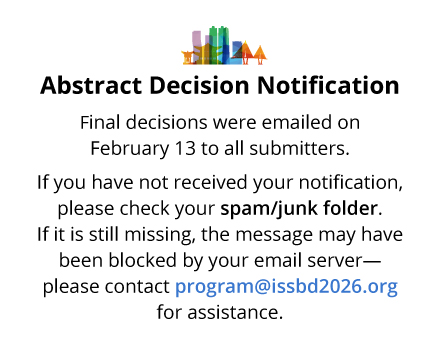Pre-Conference Workshops
for Early Career Scholars
Workshop 1. Publishing
Jennifer E. Lansford (Duke University, USA)
This workshop will focus on the publication process, highlighting perspectives from the editorial team at the International Journal of Behavioral Development. We’ll discuss tips for writing, choosing a journal, responding to reviewers’ comments, and making final revisions. We’ll concentrate primarily on peer-reviewed journal articles but will also touch on books, book chapters, and other types of publishing. There will be plenty of time for questions, discussion, and sharing ideas among attendees.
Workshop 2. Communicating within Communities: Capacity Building to Communicate your Science that Cares
Dawn England (University of Birmingham, UK), Patrick Njorge (ISSBD)
ISSBD is committed to uniting developmentalists in a science that cares – and working with, for, and within communities is a necessary component of conducting science that cares. Communicating your science in a way that communities can understand, apply, and inform is critical to advancing the integrity and impact of your work. In this workshop you will develop skills in 1) working with communities to co-construct meaningful, valid science in partnership, and 2) in communicating your science locally in contextually relevant ways. The workshop will spotlight research projects to highlight successful initiatives from ISSBD members, share best practice for community collaborations and communications, and allow ample time for workshopping your own ideas, creating dissemination tools from your existing or planned research, and develop strategies to work with local organisations.
Workshop 3. Open Developmental Science
Marlies Maes (Utrecht University, The Netherlands) & t.b.a.
The idea of Open Science represents changes in the way we do our science, in the way we develop our hypotheses, design our studies, conduct our analyses, and report our results. Open Science is about being open and transparent, and involves, for example, pre-registering your hypotheses and analyses, sharing your data and syntaxes, and communicating openly about your research to both academic and non-academic audiences. It also has consequences for the rewards and incentives we have built in our system, including decisions on grants and tenure. Together, we will explore and discuss the opportunities but also the challenges of open developmental science.
Workshop 4. Dyadic and Network Approaches to the Study of Peer Relationships
Brett Laursen (Florida Atlantic University, USA) & Rene Veenstra (University of Groningen, The Netherlands)
Peer relations significantly influence a wide range of behaviors. The similarity of behaviors within dyads and social networks can be attributed to both the choices individuals make (selection and deselection) and the influence of their peers. To advance our understanding, research is needed in two key areas: (1) exploring the effects of different types of peer relationships on behavioral development, and (2) dissecting the underlying mechanisms of peer (de)selection and influence. These new avenues in peer research have the potential to improve our understanding of peer influence and increase the effectiveness of peer interventions in addressing undesirable behaviors and promoting positive ones. This workshop will focus on methods for studying dyadic and group peer relations, with an overview of recent conceptual and empirical advances.
Workshop 5. The promise: Preparing young people and their families for the challenges of a warming world
Pamela Wadende (Kisii University, Kenia) & Sander Thomaes (Utrecht University, The Netherlands)
Climate change affects young people and their families across the world. The exact nature of these impacts, however, differs across world regions. For example, studies show that youth and their families living in LMICs, and particularly in communities that depend on predictable weather for a livelihood (e.g., pastoralists, agriculturalists), suffer the most from climate change. This hands-on workshop led by two members of the Developmental Scientists for Climate Action consortium, will start with brief introductions to the themes of how climate change impacts young people and their families, and how young people’s coping and engagement with climate change can be fostered. It will then invite participants to survey the consequences of climate change on youth in different regions of the world, highlighting both direct impacts (e.g., exposure to extreme heat), indirect impacts (e.g., forced migration after climate disaster), and vicarious impacts (e.g., the sense that one’s future is uncertain or grim). Participants will then be asked to come up with education, communication, and parenting strategies to support young people to cope with and act on climate change, based on their sociocultural contexts. The workshop aims to inform and support participants with an interest in pursuing research on climate change and youth development in their country. Together, developmental scientists can use their expertise to support young people from across the world to cope with and help mitigate climate change.
Workshop 6. An Introduction to Latent Curve Model in Developmental Science
Antonio Zuffianò (Sapienza, University of Rome) & Giuseppe Corbelli (Uninettuno University, Rome)
This workshop will offer an introduction to Latent Curve Model (LCM) for developmental research. LCM is a powerful and flexible tool to examine how individuals change over time (e.g., What is the development of prosocial behavior from childhood to adolescence?) and what factors shape individual differences in change (e.g., do children with high initial levels of inhibitory control increase more than their counterparts in prosocial behavior over time?). Participants will have the opportunity to practice their skills in using LCM, utilizing both Mplus and R. By the end of the workshop, participants will have a solid conceptual understanding of what LCM can reveal about developmental processes and how to implement LCM to study change across the lifespan.
